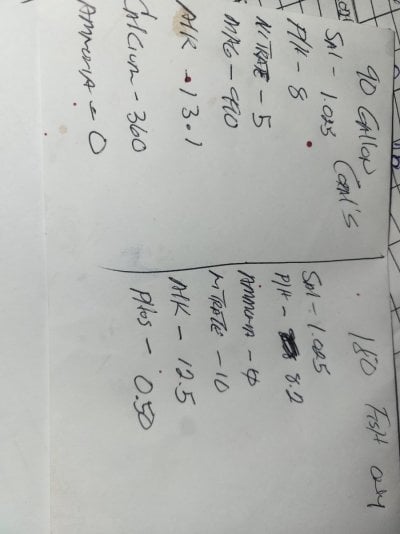Navigation
Install the app
How to install the app on iOS
Follow along with the video below to see how to install our site as a web app on your home screen.
Note: This feature may not be available in some browsers.
More options
You are using an out of date browser. It may not display this or other websites correctly.
You should upgrade or use an alternative browser.
You should upgrade or use an alternative browser.
Parameters
- Thread starter kenand
- Start date
- Tagged users None
The Alk is higher than I would personally run, and the Calcium is a bit low; the Phosphate is high too.
The quote below is from the mod of the Chemistry forum here on Reef2Reef; it has recommended ranges for parameters (the only thing typically considered important from table 2 is Nitrate).
For both tanks, you can largely ignore Magnesium, and Ammonia - once the cycle is complete - should really only need tested in the event of an emergency (such as fish deaths, massive overfeeding, etc.). For the fish only, you can also ignore Calcium and Alk (unless you have inverts like shrimp or crabs in it, then it would probably be wise to test those as well):
The quote below is from the mod of the Chemistry forum here on Reef2Reef; it has recommended ranges for parameters (the only thing typically considered important from table 2 is Nitrate).
For both tanks, you can largely ignore Magnesium, and Ammonia - once the cycle is complete - should really only need tested in the event of an emergency (such as fish deaths, massive overfeeding, etc.). For the fish only, you can also ignore Calcium and Alk (unless you have inverts like shrimp or crabs in it, then it would probably be wise to test those as well):
Table 1. Parameters critical to control in reef aquaria.

Table 2. Other parameters in reef aquaria that aquarists may want to control.

vetteguy53081
Well known Member and monster tank lover
View Badges
Partner Member 2024
Excellence Award
Reef Tank 365
RGB
Article Contributor
Tampa Bay Reef Keepers
West Palm Beach Reefer
Hospitality Award
Ocala Reef Club Member
305 Reef Club
Wisco Reefers
Midwest Reefer
Fish Medic
MAC of SW Florida
Rock Pool Reef Keepers
R2R Secret Santa 2023
My Tank Thread
My Aquarium Showcase
Take calcium to 420 and alk should have a slight drop although its not too crazy but keep it closer to 11 -11.3
You may not have too many coral which is absorbing the alk content
How are you measuring numbers?
The Alk is higher than I would personally run, and the Calcium is a bit low; the Phosphate is high too.
The quote below is from the mod of the Chemistry forum here on Reef2Reef; it has recommended ranges for parameters (the only thing typically considered important from table 2 is Nitrate).
For both tanks, you can largely ignore Magnesium, and Ammonia - once the cycle is complete - should really only need tested in the event of an emergency (such as fish deaths, massive overfeeding, etc.). For the fish only, you can also ignore Calcium and Alk (unless you have inverts like shrimp or crabs in it, then it would probably be wise to test those as well):
Thank you so much for the advice on getting me on track for what to keep to keep on my charts. What do I have to do to bring alkalinity down and phosphate down? Calcium up? You've been a great help.
For bringing Alk down, time and water changes with lower Alk water (i.e. you lower the Alk of the water in the mixing station before adding it to the tank):Thank you so much for the advice on getting me on track for what to keep to keep on my charts. What do I have to do to bring alkalinity down and phosphate down? Calcium up? You've been a great help.
Assuming the alk is high, it was suggested earlier in this thread how to lower it using acid, such as muriatic acid or sodium bisulfate to treat new salt water to give very low alk.

Sodium Bisulfate to Reduce Alkalinity in New Salt Water or in Display Tanks
I just want to record these calculations in their own thread to refer back to in other threads. When alkalinity is too high in new salt water or in a display tank, acid can be used to lower the alkalinity. You can easily use muriatic acid (hydrochloric acid), or sodium bifulfate (e.g...www.reef2reef.com
For the Phosphates, a lot of methods that reduce Phosphate levels also reduce Nitrate levels, and your Nitrate levels are fine; so to reduce Phosphate without reducing Nitrate, I'd probably use a Phosphate binding media like Aluminum Oxide, GFO, Lanthanum, etc.I’m going to remove the emergency tag as that alk level is typical of high alk salt mixes.
If you want to lower it, I’d either use a different salt water source, or drop it in the store water using sodium bisulfate or muriatic acid followed by plenty of aeration.
Personally, from what I know of these options, I'd personally probably use GFO, but the article below may help you decide what you think is best (particularly the "Phosphate Export Using Binding Media," "Phosphate Export Using Binding Media: Aluminum Oxide," "Phosphate Export Using Binding Media: Granular Ferric Oxide/Hydroxide," and "Soluble Metals to Bind Phosphate" sections):

Phosphate in the Reef Aquarium
The phosphorus atom is one of living matter's basic building blocks. It is present in every living creature and in every reef aquarium's water. Unfortunately, it is often present in excess in reef aquaria, and that excess has the potential to cause at least two substantial problems for...
www.reefedition.com
Similar threads
- Replies
- 14
- Views
- 201
- Replies
- 39
- Views
- 586
- Replies
- 2
- Views
- 193

















